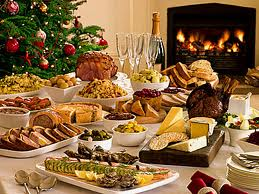
Provided by: Marsha Fuller, RD, CDN, Dietary Consultant for Parkwood Heights Senior Living
The holiday season is a time to celebrate with family and friends. Sometimes, for many it becomes a time for over-eating and weight gain.
According to the National Institutes of Health, holiday eating can result in an extra pound or two every year. Another fact is that most of us remain with the weight gain after the holidays.
For seniors, it’s especially important to realize that they should accept their doctor’s recommendations for diet and exercise during this time. Noncompliance can result in exacerbation of existing medical conditions that can ultimately shorten both quantity and quality of life. The holidays should focus on a healthy balance of food, activity, and fun, instead of weight gain. By implementing a few simple tips you can stay healthy through the holiday season.
Be realistic. Shoot for weight maintenance, instead of loss, through the holidays. Plan time for exercise! There’s 3500 calories to a pound, so that 1-2 pound average weight gain equates to about an extra 100-150 calories per day over a 6 week period. A half hour walk daily will help even the score as well as reduce that holiday stress!
Do you think sleep effects diet? Studies have shown that people who sleep less tend to weigh more. It could be metabolic or more probable that people tend to make poorer food and exercise decisions when sleep deprived. When sugar gives you a short burst of energy, it’s easier to say yes to too many Christmas cookies! For seniors, it’s difficult to acclimate to too much activity and change of schedule (including eating), so try to keep set schedules with ample rest time in between.
Keep regular meal schedules. Make it a habit to eat some fruit or vegetables before you go to a party. You will be less tempted to over-indulge. Bring a healthy dish to parties to help give everyone healthy options. Fill your holiday plate with greater portions of fruits and vegetables and smaller portions of calorie dense foods. If you overeat on one meal, go light on the next. Eat slowly! (It takes 20 minutes for your brain to signal your belly that it’s full.)
Cook only what you need. There are many of web sites that will calculate recipes for the number of portions you need. Fewer leftovers mean you can get back to eating healthy quicker!
Eat your calories, don’t drink them. Sugary beverages provide significant calories but do nothing to satisfy hunger. And alcohol reduces inhibitions that can make you more prone to other poor choices, as well.
Finally, take the focus off food and place it where it belongs, the spirit of the season and precious time with those we love. Enjoy food in the right portions, with a healthy frame of mind.
